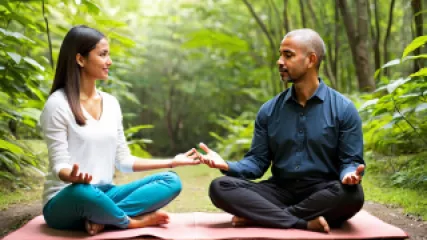Top 10 Strategies for Effective Communication in Mindfulness
Effective communication is a fundamental aspect of our daily lives, influencing our relationships, professional interactions, and overall well-being. When we engage in mindful communication, we bring awareness, compassion, and presence to our conversations, fostering deeper connections and understanding. In this article, we will explore the top 10 strategies for effective communication in mindfulness, empowering you to cultivate healthier relationships and enhance your emotional well-being.
1. Cultivate Presence
The first step towards effective communication in mindfulness is cultivating presence. By being fully present in the conversation, you can actively listen and engage with others. Practice letting go of distractions, such as thoughts about the past or future, and focus on the person and their words in the present moment. This creates a space for open and authentic communication.
2. Practice Active Listening
Active listening is a key component of effective communication. When someone is speaking, give them your full attention without interrupting or formulating responses in your mind. Focus on understanding their perspective, feelings, and needs. Reflect back what you hear to ensure accurate comprehension and demonstrate that you are fully engaged in the conversation.
3. Develop Empathy
Empathy is the ability to understand and share the feelings of another person. By developing empathy, you can communicate with compassion and create a safe and supportive space for others to express themselves. Put yourself in the other person's shoes, try to understand their emotions, and respond with kindness and understanding.
4. Express Yourself Clearly
Clear and concise communication is essential for effective dialogue. Take the time to reflect on your thoughts and emotions before expressing them. Use language that is simple, direct, and respectful. Avoid making assumptions about what others know or understand, and be open to clarifying any misunderstandings.
5. Practice Nonviolent Communication
Nonviolent communication, also known as compassionate communication, is a powerful tool for fostering understanding and resolving conflicts. It involves expressing yourself honestly while respecting the other person's perspective. Focus on observations, feelings, needs, and requests rather than blame or criticism. This approach promotes empathy and constructive dialogue.
6. Set Healthy Boundaries
Setting healthy boundaries is crucial for maintaining respectful and effective communication. Clearly communicate your needs, limits, and expectations to others. Be assertive in expressing what is acceptable and what is not. By setting boundaries, you create an environment of mutual respect and ensure your emotional well-being.
7. Be Mindful of Nonverbal Communication
Nonverbal communication, such as body language, facial expressions, and tone of voice, can greatly impact the effectiveness of your message. Pay attention to your own nonverbal cues and how they may influence the conversation. Similarly, be attentive to the nonverbal cues of others, as they can provide valuable insights into their emotions and intentions.
8. Practice Patience
Patience is a virtue when it comes to effective communication. Allow others the time and space to express themselves fully. Practice active listening and avoid rushing to respond or interrupt. By cultivating patience, you demonstrate respect for the other person's thoughts and promote a more meaningful exchange of ideas.
9. Foster Open-Mindedness
Open-mindedness is essential for effective communication in mindfulness. Approach conversations with a willingness to learn, grow, and challenge your own beliefs. Be open to different perspectives and ideas, even if they differ from your own. This openness fosters curiosity, deepens connections, and promotes a more inclusive and constructive dialogue.
10. Reflect and Learn
Reflection is a valuable practice for enhancing your communication skills. Take the time to reflect on your conversations, identifying areas for improvement and growth. Consider how your words and actions may have impacted others and explore ways to enhance your communication in future interactions. Learning from each experience allows you to continually refine your communication skills and deepen your connections with others.
By incorporating these top 10 strategies for effective communication in mindfulness into your daily life, you can cultivate deeper connections, foster understanding, and promote emotional well-being. Remember that effective communication is a skill that can be developed with practice and intention. Start implementing these strategies today and witness the positive impact they have on your relationships and overall communication.






